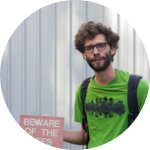About This Project
Bees need protein to develop and maintain their health. Pollen is their only source of protein, but intensive agriculture is reducing the amount and quality of pollen available. Beekeepers increasingly have to give bees protein supplement to help them survive, but is this enough? We will examine what proteins are best for bees and how much they need to become a strong and healthy forager. This will help the bees and the beekeepers, ensuring our crops continue to be well pollinated.
Ask the Scientists
Join The DiscussionWhat is the context of this research?
Pollen is crucial for the development of honeybees: it is their only source of protein. If the bees cannot harvest enough pollen, they simply won't be able to maintain a healthy hive or raise the next generation of foragers. Because of modern agriculture and landscape changes, honey bees struggle to find enough pollen and beekeepers have to supplement them with proteins. Is this diet sufficient to help the bees? We don't know. Despite the expensive cost of this diet, it is still not clear whether it helps the bees. Recent studies even suggest that too much protein could be harmful for bees and other insects such as ants and bumblebees. Studying the impact of protein supplements on bee colonies will allow beekeepers to have more bees to produce more honey and pollinate flowers.
What is the significance of this project?
Pollen shortages have dramatic impacts and can lead to a complete collapse of the colony. We will determine what kind and quantity of proteins can help the bees to maintain a healthy hive. Beekeepers need this information to save their colonies during pollen shortages or when they start new colonies. It will help the bees to raise more brood and to maintain a healthy hive, it will help the beekeepers to produce more honey because they will have more bees, and it will help the farmers to produce our food, because it will ensure that our crops continue to be well pollinated.
What are the goals of the project?
We will use microchips to track individual bees for their entire foraging life. This does not harm them, it’s like carrying a small backpack. Sensors at the hive entrance detect the chips, weigh and photograph the bees so that we can calculate how many trips they do, how much food they bring back and how long they survive.
The bees will be raised in very different conditions. Some will be raised in hives harvesting natural pollen from flowers, some will be raised in colonies deprived of pollen, and a last group will be raised in colonies deprived of pollen but fed with a protein supplement.
By comparing the efficiency of the workers raised in those different conditions, we will be able to tell the beekeepers which and how much protein to give to their bees.
Budget
We will tag 5000 bees with RFID tags to get a realistic measure of the impact of pollen shortages and protein feeding on honey bees. We inherited most of the equipment from previous experiments, but we need your help to buy new RFID tags, proteins and beekeeping equipment.
Endorsed by
Meet the Team
Affiliates
Simon Klein
I am a PhD candidate working in Toulouse University in France and Macquarie University in Australia. I feel very concerned by the ongoing pollinators decline. I decided to study the behaviour and ecology of bumblebees and honey bees to help understanding the reasons for their decline. I am thus looking at the impact of pesticides on their health and change in behaviour. I am also trying to determine why some foragers are more efficient than others, and how to give them the best conditions during their development to grow as strong and efficient workers.
Lab Notes
Nothing posted yet.
Project Backers
- 68Backers
- 92%Funded
- $2,605Total Donations
- $38.31Average Donation


